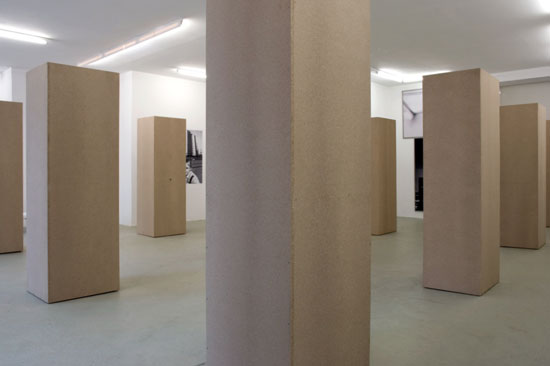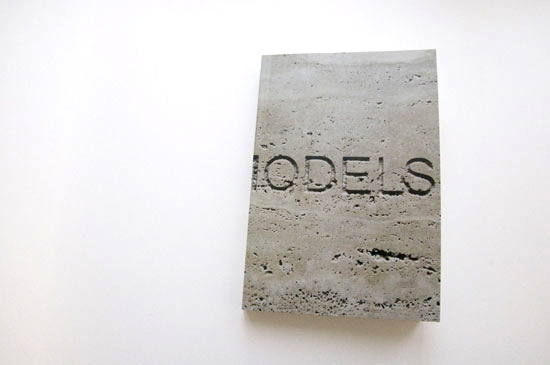UEBERMODELS
a project by Niels Betori Diehl and Barbara K. Prokop
with contributions by
Niels Betori Diehl, Monica Bonvicini, Ute Diehl, Albrecht Fuchs, Cyprien Gaillard, Helmut Geisert, Stefan Heidenreich, Harald Hermann, Hans Kollhoff, Helmut Lang, Sol LeWitt, Enzo Mari, Barbara K. Prokop, Joyce Rohrmoser, Katharina Sieverding, Sissel Tolaas, Andrea Übelacker, Andreas Waris, Stephen Willats, Christine Woditschka
September 16 – October 16, 2010

I handle myself quite well. I'm kind of fascist with myself,
you
know. There's no discussion. There is an order. You follow it.
Karl Lagerfeld
In a society where everything is forbidden, one can do
everything: in a society where something is permitted, one
can only do that something.
Pier Paolo Pasolini
Irrational thoughts should be followed absolutely and logically.
Sol Lewitt, from ‘Sentences on Conceptual Art’
know. There's no discussion. There is an order. You follow it.
Karl Lagerfeld
In a society where everything is forbidden, one can do
everything: in a society where something is permitted, one
can only do that something.
Pier Paolo Pasolini
Irrational thoughts should be followed absolutely and logically.
Sol Lewitt, from ‘Sentences on Conceptual Art’
What is it that makes the idea of fascist architecture so appealing? Probably this uncompromising devotion to itself, the fact that, under such a restrictive regime like Mussolini's Italy, architects seemed to enjoy unlimited freedom and were able to create buildings as well as entire cities that have since become icons of elegance. Although the risk of falling back into an "old-school" fascist system seems quite remote in the western world, fascist tendencies can hide in much less obvious manifestations of conformity. The prevailing idea that everyone should be involved in creative processes has turned out to be a mock freedom, as it forces everyone to make constant choices in total absence of any parameters other than those delivered by the media. In a world bereft of ideologies, which is filled with stuff made accessible from almost everywhere, there is an enormous lack of accuracy as well as an enormous want for aesthetical guidelines. It is a world in which it has become daring, although necessary, to state that we are in dire need of superordinate models, even if they might not be at our disposal.
With UEBERMODELS we analyze the relationship between "self-fascism" and conceptual work in a time of too much: too much information, too many images, too many influences, too many paths to choose from. Pointing out examples of strictness and precision in artistic practice, as well as in other forms of intellectual production like architecture, design, fashion, and also within different theoretical discourses, we combine these contributions with our own reflections to look at how the need for something sharp and clear, something to hold on to as an aesthetic tower of strength is expressed within different disciplines, focusing on conceptually strategic aspects. Multidisciplinarity is intended here as a bringing together of diverse positions that already understand themselves as interdisciplinary. The individual components of UEBERMODELS relate, contradict and play with one another. Diverse practices and techniques are meant to generate a complex reading, allowing us to compose a multifaceted statement about the possibilities of utopian thought and the subtle pleasure of self-restraint.
Within UEBERMODELS we are looking for possible definitions of typologies, of a rule, of the ideal, in a time in which increased knowledge/capabilities have rendered it no longer possible to remain naïve and to fall back on an apparent spontaneous expressivity, while at the same time we seem to be condemned to a constant jadedness that paralyzes us. A way to come to terms with this dilemma could be that of cultivating belief and disbelief simultaneously, accepting the fact that in this era of self-consciousness we tend to have a nostalgic approach towards things that appear to have been created with a certain innocence, in a past "state of grace": this "romantic" look at things can work as a driving force, but can also turn out to be a trap, as it keeps us stuck in times long gone and reduces us to consumers of quotes.
The main focus of UEBERMODELS lies on the strategy of reduction, not intended as a formal point of departure that leads to a sterile minimalism, but in terms of an intellectual process that results in an increase in complexity. Our interest is to draw a parallel between the characteristics of two main disciplines: the dogmatism and functional constraints of architecture/urban planning, reflected in the severity of the related discourses, and the self-constraining strategies of conceptual art. By creating a context for the presentation of different intellectual processes in the shape of a variety of products and statements - leaving space to the viewer to find interconnections - we intend to investigate the questions initially raised, the self-assigned tasks, the way these intellectual processes are approached, the intentions and motivations that drive them and the results achieved.
All the positions presented in UEBERMODELS appear to be guided by a longing for a genuine and contemporary form of authenticity - intended not as truth, but truthfulness - and they employ a kind of irony that is an expression of simultaneous commitment and detachment. The will to say something essential about the world - be it by molding a small part of it or by merely observing it - requires some self-deception and a belief in the possibility of perfection that can only exist in the form of theoretical models and resembles more a surge towards a joyous despair.
"One must imagine Sisyphus happy", Albert Camus wrote.
With UEBERMODELS we analyze the relationship between "self-fascism" and conceptual work in a time of too much: too much information, too many images, too many influences, too many paths to choose from. Pointing out examples of strictness and precision in artistic practice, as well as in other forms of intellectual production like architecture, design, fashion, and also within different theoretical discourses, we combine these contributions with our own reflections to look at how the need for something sharp and clear, something to hold on to as an aesthetic tower of strength is expressed within different disciplines, focusing on conceptually strategic aspects. Multidisciplinarity is intended here as a bringing together of diverse positions that already understand themselves as interdisciplinary. The individual components of UEBERMODELS relate, contradict and play with one another. Diverse practices and techniques are meant to generate a complex reading, allowing us to compose a multifaceted statement about the possibilities of utopian thought and the subtle pleasure of self-restraint.
Within UEBERMODELS we are looking for possible definitions of typologies, of a rule, of the ideal, in a time in which increased knowledge/capabilities have rendered it no longer possible to remain naïve and to fall back on an apparent spontaneous expressivity, while at the same time we seem to be condemned to a constant jadedness that paralyzes us. A way to come to terms with this dilemma could be that of cultivating belief and disbelief simultaneously, accepting the fact that in this era of self-consciousness we tend to have a nostalgic approach towards things that appear to have been created with a certain innocence, in a past "state of grace": this "romantic" look at things can work as a driving force, but can also turn out to be a trap, as it keeps us stuck in times long gone and reduces us to consumers of quotes.
The main focus of UEBERMODELS lies on the strategy of reduction, not intended as a formal point of departure that leads to a sterile minimalism, but in terms of an intellectual process that results in an increase in complexity. Our interest is to draw a parallel between the characteristics of two main disciplines: the dogmatism and functional constraints of architecture/urban planning, reflected in the severity of the related discourses, and the self-constraining strategies of conceptual art. By creating a context for the presentation of different intellectual processes in the shape of a variety of products and statements - leaving space to the viewer to find interconnections - we intend to investigate the questions initially raised, the self-assigned tasks, the way these intellectual processes are approached, the intentions and motivations that drive them and the results achieved.
All the positions presented in UEBERMODELS appear to be guided by a longing for a genuine and contemporary form of authenticity - intended not as truth, but truthfulness - and they employ a kind of irony that is an expression of simultaneous commitment and detachment. The will to say something essential about the world - be it by molding a small part of it or by merely observing it - requires some self-deception and a belief in the possibility of perfection that can only exist in the form of theoretical models and resembles more a surge towards a joyous despair.
"One must imagine Sisyphus happy", Albert Camus wrote.
Niels Betori Diehl and Barbara K. Prokop
*The exhibition is accompanied by a reader, film screenings and talks by Stefan Heidenreich, Hans Kollhoff and Katharina Sieverding.

The UEBERMODELS reader was created to act as a theoretical component to the exhibition. It works as a guide through the contributions displayed, while simultaneously standing on its own. Based on the associative interdisciplinary approach of the exhibition, the UEBERMODELS reader holds a collection of texts, interviews, images and quotes. With theoretical contributions by Ute Diehl, Helmut Geisert, Stefan Heidenreich, Hans Kollhoff and interviews with Niels Betori Diehl, Monica Bonvicini, Albrecht Fuchs, Cyprien Gaillard, Harald Hermann, Hans Kollhoff, Helmut Lang, Sol LeWitt, Enzo Mari, Barbara K. Prokop, Joyce Rohrmoser, Katharina Sieverding, Sissel Tolaas, Andrea Übelacker, Andreas Waris, Stephen Willats, Christine Woditschka.